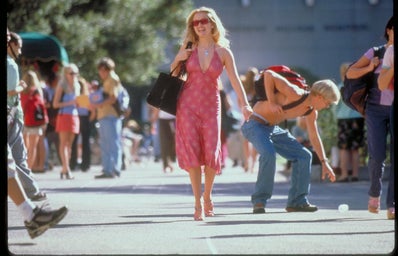Women are often taught to believe that personal and professional do not go hand in hand. Sacrificing the effeminate will guarantee you making partner in your firm, or playing it quiet in class will earn you the best grade. However, glamour and achievement need not be in competition because combined, these are the very skills that may just propel a woman forward as a proprietor of her own future, both within the workplace and outside.
Ambition is a term that has a large male-connotation; where males are often associated with career success, women are still naturally perceived as nurturers and homebodies. Though what it means to be and act like a woman today has changed significantly, there are ingrained ideologies that truthfully may never be shaken from society. Women are disdained both in the professional world for being “too soft” or “emotional,” but women who choose to pursue different careers or paths, such as modeling, are just as easily brushed off as “silly” or “immature.” Women should never settle for lives they don’t want or feel ashamed for the paths they do choose—in fact, it is their feminine appeal and wit which may help them make strides in life in the first place.
During the Second World War, women were recruited to work while the men fought. Once the men returned, women were promptly ushered back into the kitchen, yet a new fire burned in many women’s bellies with a glimpse into ambitions of their own. Films began to reflect the conflict many women felt regarding the balance of family and work life.
In the 1940 film “His Girl Friday,” Rosalind Russell portrays the charismatic and wildly intelligent Hilda Johnson (Hildy), a top newspaper reporter, who has declared she is retiring and has plans to become an ordinary household wife in Albany, New York. Though she is successful in her professional field, she makes no apologies when she announces that she is leaving to be married and settle down. It is only when Walter Burns (Cary Grant), her ex-husband and former editor, pulls her back into the world of journalism for one last story (hoping to pull her back to him in the process) that Hildy begins to wonder where her real goals lie.
As a highly successful journalist in a male-dominated field, it’s clear that Johnson is not searching for love, and she excels at the craft of writing with grandeur for her own pride alone, outwitting her male counterparts in the process. Where the other characters are concerned only with the facts of the story, Hildy has compassion, and this is how she navigates in her life, with the precise combination of skill and empathy. As she attempts to release the wrongly convicted Earl Williams from an execution, she approaches the matter with womanly kindness.
It is easy to view this film from the lens of Johnson conforming to the standards of “male” professional behavior and turning away from love, but contrarily the film encompasses how she ultimately finds a world best suited for all of her desires, both emotionally and competently. In one of the final scenes, Hildy begins to cry, expressing the conflict she feels to balance what is expected of her in her career with the longing she has for domesticity. Walter Burns represents a perfect harmony to her, a path by which she can wittily succeed in her career and simultaneously satisfy her inner desire for something more suburban.
Ambition in life can refer to professional ambition, but it doesn’t always. The way in which a woman uses agency does not always have to be for a deeply intellectual reason—that is, to pursue a fine degree or dominate a specific field—but rather, anything a woman chooses to aim her energy towards.
Holly Golightly is one of the most well-known “bimbos” in film history. In “Breakfast at Tiffany’s” (1961), audiences meet the bright and seemingly innocent Golightly (Audrey Hepburn) and immediately assume the worst. At the beginning of the movie, it is easy to believe that Golightly is the fool, as she stumbles around her apartment sipping milk out of a champagne glass, revealing a slipper in her fridge and getting highly overdressed for a visit to Sing Sing, for which her visit reasons are highly susceptible and vague. Yet, to brush Holly off as ditzy and silly diminishes her own tools, for where she is not equipped with professional drive, she makes up for it with wit and charm. It is not her life’s mission to be occupationally ambitious, but rather her ambitions are rooted in her wild lifestyle. It is natural to view Golightly as a “failure” because her lifestyle doesn’t measure up to the unglamorous standards of the professional world. Despite an appearance of no substance, she is enthralled by a thrifty life of partying and refuses to change for anyone, telling Paul Varjak during the film’s climax, “People don’t belong to people.”
The same goes for Lorelei Lee, portrayed by Marilyn Monroe, in the film “Gentlemen Prefer Blondes” (1953). She is immediately limited to the image of “blonde bombshell,” in which the only thing worth noting is her looks. Lee is criticized for having seemingly “simple” interest in diamonds for, as her companion Dorothy Shaw (Jane Russell) quips, “Only you can be on-stage with a spotlight in your eye and still see a diamond in a man’s pocket.” Though others frown upon this way of thinking, Lee is unapologetically looking for love. In a life of glitz and glamour, Lee is empowered by leading the life she wants without doubt.
Where Golightly and Lee fall short in white-collar goals, they make up for it in the ambition for a glamorous life. A glamorous life entails the intentional disguised as the accidental, the ordinary masked as extraordinary and the mundane as absolutely magical. The term began to gain notoriety and signature in the ‘50s and ‘60s when women were taught to use their beauty as best they could. Though this could be misconstrued as sexist (and it is, to an extent), women saw an opportunity to use their femininity as something more constructive: agency.
Simplicity is easily confused with ignorance. To see Golightly and Lee as “bimbos” is to deny their personal power. While Hildy is enthralled by a life of high-stakes journalism with romance brushed under the rug, Holly is driven by the desire for a gloriously fun life—and Lee just happens to love diamonds, and what’s wrong with that? Hildy is certainly not excluded from feminine ideals, as a woman may be glamorous both through her behavior or the wit she can drop at a moment’s notice. Ambition boils down to agency and the ability to choose the life she wants in as fashionable a manner as she wants it. Each of these characters show up as their highest selves with no regret and certainly no apologies.
Female characters like Hildy and Golightly would help pave the way for future icons, and few female characters have had such a significant impact on femininity in the professional realm in the 21st Century than that of Miss Elle Woods from “Legally Blonde” (2001). Beginning as an “un-serious” sorority girl from California who chases after her ex-boyfriend to Harvard Law, Elle, played by Reese Witherspoon, evolves: from a perky woman willing to change in order to win love, which she believes to be the most important, to a successful law student who finds a personal ambition along the way. Woods ultimately refuses to sacrifice such an integral piece of herself to conform, dazzling the courtroom in a fantastic pink suit while she does so.
Carol Dyhouse has written about the history of traditional glamour and its relationship to feminism in “Glamour: Women, History, Feminism,” saying, “Glamour could be seen as both risk and self-assertion, or as a resource which might be used by women.” If being unapologetically feminine is your style, embrace the dainty in the pursuit of ambition and the finer things in life.


